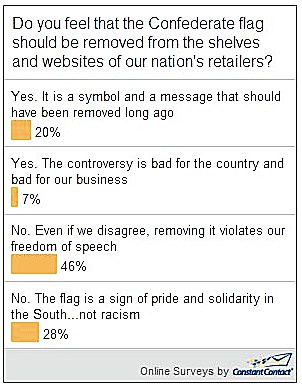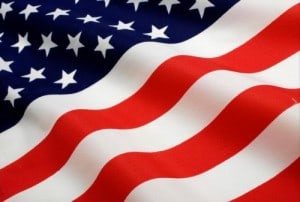Editor’s Note: As LP Magazine looks back at some of the top articles of 2015, this story reminds us of the strength of our nation, the importance of freedom of speech, and the power of our collective voice.
When we look at a business as fluid as the retail industry, there are many different reasons why a particular retail trend grabs our attention, and then gathers momentum. Perhaps some of the most prominent—and most controversial—take place in response to real events that can impact each and every one of us in some way.
As part of the annual celebration of the birth of our nation, we remember that the red, white and blue on the American flag symbolize freedom, ambition, hope and pride that are a part of this great nation. Some of the more prominent events that took place during this week in American history include:
On June 29, 1995 the American space shuttle Atlantis docks with the Russian space station Mir to form the largest man-made satellite ever to orbit the Earth. Events such as this mark the drive and ingenuity of the American spirit, and the great things that we can accomplish when we work together.
On July 2, 1964, U.S. President Lyndon B. Johnson signed into law the historic Civil Rights Act in a nationally televised ceremony at the White House. The most sweeping civil rights legislation passed by Congress since the post-Civil War Reconstruction era, the Civil Rights Act prohibited racial discrimination in employment and education and outlawed racial segregation in public places. The bill also laid important groundwork for a number of other pieces of legislation protecting the rights of all Americans.
On July 3, 1863, the third day of the Battle of Gettysburg, Confederate General Robert E. Lee’s last attempt at breaking the Union line ended in disastrous failure, bringing the most decisive battle of the American Civil War to an end. The Battle of Gettysburg was the turning point in the Civil War, a war that helped our nation overcome many divisive issues but most known for ending slavery. The war left the Union with 23,000 killed, wounded, or missing in action. The Confederates suffered some 25,000 casualties.
On July 4, 1776 in Philadelphia, Pennsylvania, the Continental Congress adopted the Declaration of Independence, proclaiming the independence of the United States.
This is a time when we recognize great victories, great tragedies, and great change in our country; representing the resilience and tremendous accomplishments that have marked our national history as well as embodying the promise that the future holds.
Unfortunately, those same colors can mean something completely different. When associated with the Confederate flag it is seen by many today—both here and around the world—as a source of hatred, division and controversy.
That controversy has once again come to light after a white gunman, who allegedly wanted to start a “race war” shot and killed nine people inside a historic African-American church in Charleston, South Carolina. It continues as Governor Nikki R. Haley calls for South Carolina to do what just a few short weeks ago seemed politically impossible—removing the Confederate battle flag from its perch in front of the State House building in Charleston. She argued that a symbol long revered by many Southerners was viewed by many others as a “deeply offensive symbol of a brutally offensive past.”
As part of a current retail trend we have retailers coming together, vowing to remove the Confederate flag from shelves and websites across the country in an assertive message that some feel is long overdue. Walmart sparked this latest retail trend with the announcement that it is removing any items that feature the Confederate flag. “We have taken steps to remove all items promoting the Confederate flag from our assortment — whether in our stores or on our website,” the company said. “We have a process in place to help lead us to the right decisions when it comes to the merchandise we sell. Still, at times, items make their way into our assortment improperly — this is one of those instances.”
Momentum for the retail trend continues to build as Walmart, Amazon, Ebay and Sears have now announced bans on Confederate flag merchandise, and others have vowed to follow. Others may discount the negative connotations associated with the emblem, and claim it is nothing more than a simple statement of southern pride. Still others may take a different stance, seeing this as a “freedom of speech” issue that shouldn’t be debated on the retail shelves of our nation. Whatever the opinion, it is a topic that is now front and center, and a discussion that needs to be had. It is a travesty that so often it takes horrific events to bring about needed change. Let’s hope this one accomplishes that task—long overdue in the hearts of so many of us.
Flags across the country were flown at half-mast following the tragic events in South Carolina. Many more will be flying high as we look to celebrate our nation’s 139th birthday. That is the only flag that matters this week. As we remember all of those that have given so much to make this country what it is today, we should also remember that it is up to each and every one of us to make sure that our colors run true.
Based on these important events, this LP Magazine Online poll question asked: : Do you feel that the Confederate flag should be removed from the shelves and websites of our nation’s retailers?
Here’s What You Think
When asked to voice their opinions on the current retail trend, it became quite clear that the topic holds significant interest and strong opinions based on the response to the poll and the discussions across social media.
 Let’s begin by stressing that this particular retail trend is a subject that currently holds much interest across retail channels as well as nationwide. It is a topic that many are passionate about, have an opinion on, and one that is relevant to the business of retail. Our intent is not to put a political slant on the subject, but rather provide a platform for thought and discussion. We want to give the LP community a voice in a way that will give every individual an opportunity to respond, provide meaningful feedback, and do so in a way that still allows for anonymity in order to get a true feel for the subject at hand. This is the message and spirit of our questions, and the objective of our polls.
Let’s begin by stressing that this particular retail trend is a subject that currently holds much interest across retail channels as well as nationwide. It is a topic that many are passionate about, have an opinion on, and one that is relevant to the business of retail. Our intent is not to put a political slant on the subject, but rather provide a platform for thought and discussion. We want to give the LP community a voice in a way that will give every individual an opportunity to respond, provide meaningful feedback, and do so in a way that still allows for anonymity in order to get a true feel for the subject at hand. This is the message and spirit of our questions, and the objective of our polls.
Approximately 27 percent of respondents agree that the Confederate flag should be removed from retail shelves and websites. Nearly three quarters (74%) of those individuals stressed that they believe that the Confederate flag is a symbol and a message that should have been removed long ago.
However, approximately 74 percent of respondents disagree with the current retail trend, believing that the flag should not be removed from our retails shelves and websites. Of those participants, nearly two-thirds (62%) feel that this is more an issue that involves freedom of speech rather than what might be considered a proclamation in agreement with the negative connotation that the flag represents in the eyes of many Americans. The remaining respondents see the flag as a sign of pride and solidarity in the South—and not a symbol of racism.
Clearly, the Confederate flag sends different messages to different individuals; which is likely the primary reason that the flag still appears so prominently in particular areas and within certain cultures in the country. The message in support of free speech voiced by the majority of our respondents is also a powerful reminder to all of us that there is a vital need in this country for all Americans to be able to express their opinions, even when we don’t agree with that opinion. By the same respect, free speech is as much a responsibility as it is one of our rights as citizens. That responsibility is something that we should all keep in mind as we consider the many different ways that we express ourselves.
Perhaps the most important message is that what is most important is what is in our hearts. The symbolism that is captured by a flag or any other emblem or image may mean different things to each of us, but it is our thoughts and actions that matter most. There can be a tremendous difference between how we choose to express ourselves and how that message is perceived; and it is just as important for us to reflect upon our voice, our actions, and ultimately the methods that we use to share those views. What is the message that you want to send?
Editor’s Note: As a follow-up to the story, the Confederate flag was removed from the South Carolina state Capital grounds on July 10, 2015. It was moved to the “relic room” of a military museum in the state capital of Columbia to reside with other artifacts carried by southern Confederate soldiers 150 years ago.
This article was first published in July, 2015 and updated in December 2015.


